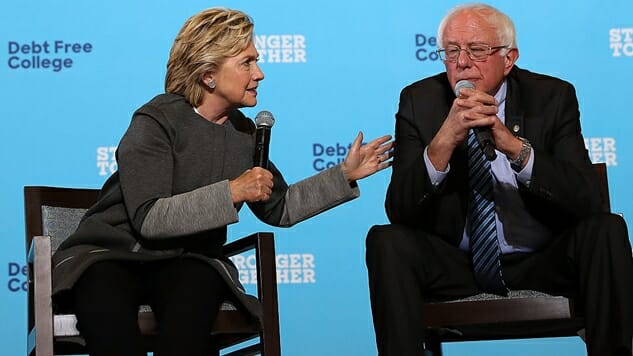The Media’s Big Fat Bernie Blind Spot
Photo by Justin Sullivan/Getty
The press has ignored an enormous factor in Hillary Clinton’s loss.
Emails. James Comey. Clinton Foundation. Deplorables. Pneumonia-gate. Wall Street speeches. More emails.
It took a perfect storm, fueled by false equivalence reporting, for Hillary Clinton to lose the 2016 election. Donald Trump didn’t just need an inside straight, per Karl Rove’s analogy; he needed a straight flush.
But in the mouth-agape post mortems since November 8, analysis of one factor has been nearly absent: Clinton’s failure to select Bernie Sanders as her running mate. It is mind-boggling that, amid unlimited cyber-space and content-starved 24/7 news channels, the passing over of Sanders received so little attention.
Need proof? Google “Hillary Clinton should have picked Bernie Sanders as vice president.”
Two top results are from a nearly invisible site called Quora.com. Other first-page items include a pre-selection CNN opinion piece espousing why Sanders shouldn’t be chosen; a post-pick piece on conservative gasbag Glenn Beck’s website, The Blaze, mocking Clinton for not selecting Sanders; and, forebodingly, Huffington Post coverage of a June 2016 Monmouth University poll revealing that 39% of respondents would be more likely to support the Democratic ticket if Sanders were on it—a figure whose +19% net effect annihilated five other possible VP picks, including the in-the-red -4% garnered by eventual nominee and human Ambien, Tim Kaine.
Fact: Bernie Sanders won 23 primary contests, a runner-up win total matched only by Hillary herself, in 2008. Granted, Obama didn’t select Clinton that year, but circumstances were much different. Given George W. Bush’s historic unpopularity, Obama was on the right side of a change election, and had won the nomination by galvanizing an under-30 base that Democrats depend upon. In 2016, Hillary represented a tenuous status quo, and became the party’s nominee despite the youth vote.
Obama, then, didn’t need a VP pick that (1) convinced voters of the ticket’s attractiveness as a change agent, and (2) energized the party base. By contrast, during the 2016 primaries Clinton received nearly 300% less votes from the under-30 set. That’s not a typo: Sanders claimed over two million millennial votes to Clinton’s 766,000.
This didn’t go unnoticed at Camp Clinton: the eventual 2016 Democratic Platform reflected Sanders’ indelible influence on issues like the minimum wage, college costs and trade deals.
Selecting Sanders as VP would have provided much-needed sincerity insurance, cementing Clinton’s intentions to deliver on ambitiously progressive promises made only after feeling the Bern on her heels. But Sanders didn’t even get seriously considered. Why? And where was the media coverage of this tone-deaf shunning?
A Vast Centrist Conspiracy?
-

-

-

-

-

-

-

-

-

-

-

-

-

-

-

-

-

-

-

-

-

-

-

-

-

-

-

-

-

-

-

-

-

-

-

-

-

-

-

-








































